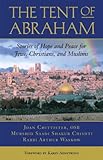The Tent of Abraham
By Joan Chittister, OSB, Murshid Saadi Shakur Chishti and Rabbi Arthur Waskow
Forward by Karen Armstrong
Boston, Massachusetts: Beacon Press, 2006
Review by Carl McColman
 Given the insanity currently going on in southern Lebanon (not to mention similar, underreported violence in Gaza), this book could not be more timely. Three American authors — a Benedictine nun, a rabbi, and a Sufi — joined forces to write this hopeful book which teases out the story of Abraham, his two sons and their mothers, in an effort to look at how the disparate cultures of Judaism, Christianity and Islam can somehow come together in our day to foster real peace in the middle east (and beyond). The book is a celebration of story and hermeneutic as much as it is a call for peace, as it teases out the many layers of meaning in the Abraham story (as well as considering how the story has been told and retold in different ways within the different faith communities). The authors begin by simply retelling the story, each from the perspective of his or her faith tradition. Naturally, the Jewish tradition focusses on Sarah and Isaac, while the Arab/Muslim tradition prefers the perspective of Hagar and Ishmael. The authors not only consider the canonical stories as found in Genesis and the Quran, but also look at midrash, folklore, and commentary as it has enlarged our understanding of the story down the ages. Thus, the terror of Abraham, who essentially turns out to be a threat to the life of both his sons, is faced honestly; much is made of the scriptural tradition that the two sons came together after the father's death to bury him — and then to settle down together.
Given the insanity currently going on in southern Lebanon (not to mention similar, underreported violence in Gaza), this book could not be more timely. Three American authors — a Benedictine nun, a rabbi, and a Sufi — joined forces to write this hopeful book which teases out the story of Abraham, his two sons and their mothers, in an effort to look at how the disparate cultures of Judaism, Christianity and Islam can somehow come together in our day to foster real peace in the middle east (and beyond). The book is a celebration of story and hermeneutic as much as it is a call for peace, as it teases out the many layers of meaning in the Abraham story (as well as considering how the story has been told and retold in different ways within the different faith communities). The authors begin by simply retelling the story, each from the perspective of his or her faith tradition. Naturally, the Jewish tradition focusses on Sarah and Isaac, while the Arab/Muslim tradition prefers the perspective of Hagar and Ishmael. The authors not only consider the canonical stories as found in Genesis and the Quran, but also look at midrash, folklore, and commentary as it has enlarged our understanding of the story down the ages. Thus, the terror of Abraham, who essentially turns out to be a threat to the life of both his sons, is faced honestly; much is made of the scriptural tradition that the two sons came together after the father's death to bury him — and then to settle down together.At its heart, this book simply asks Rodney King's question: why can't we all just get along? If Isaac and Ishmael are brothers, and if whatever enmity that existed between them was more their parent's doing (and was put aside at the time of the father's death), then shouldn't that be the blueprint for creating a world where Jews, Christians and Muslims co-exist peacefully and with honor and respect for one another? While the book with its American authorship and liberal publisher may suffer the fate of reaching (and preaching) only to the choir, its message remains powerful in its simplicity and deserving of as wide a readership as it can possibly find.
Each author brings a wonderfully unique perspective. Rabbi Waskow goes right after the hard questions as he deconstructs the story's layers of terror — but always with an eye to finding a hope which transcends the traditional ways in which Abraham has been used as a focus of tribal (rather than global) identity. Sister Chittister situates her understanding of the story within her life experience as a peacemaker who has worked extensively with both Israeli and Palestinian women. Finally, Chishti (who may be more familiar to some readers by his Anglo name Neil Douglas-Klotz) brings a Sufi's mystical sensibility to the story, considering how each of the five principle characters live within all of us as dimensions of our individual souls. Rounding out the book is a brief section of essays considering ways to foster peace: through creating interfaith forums where we may greet our long lost "cousins" and hopefully build relationships, along with suggestions for shared holidays, particularly this year and in 2007 when the sacred months of Ramadan and Tishrei coincide.
The final chapter may be the most explosive. It's a retelling of the story of the circumstances by which Hagar and Ishmael left Abraham, told from the perspective of the women (both Hagar and Sarah) and suggesting that the enmity between the women as reported in the old stories may have been fabricated by the women themselves in an effort to protect the children from Abraham's miguided zeal. Could the story of Hagar's and Ishmael's banishment actually be history's most long-standing cover-up? In exploring this question, what emerges is a fascinating new telling of the tale, with polyamorous overtones even as it challenges the dangers of religious fanaticism.
If you have any concern for peace (particularly in the middle east) or for interfaith work (particularly among the three Abrahamic faiths), The Tent of Abraham is a must-read. But as soon as you're done with it, give it away or loan it out. It needs to reach as many people as possible.


0 Comments:
Post a Comment
<< Home